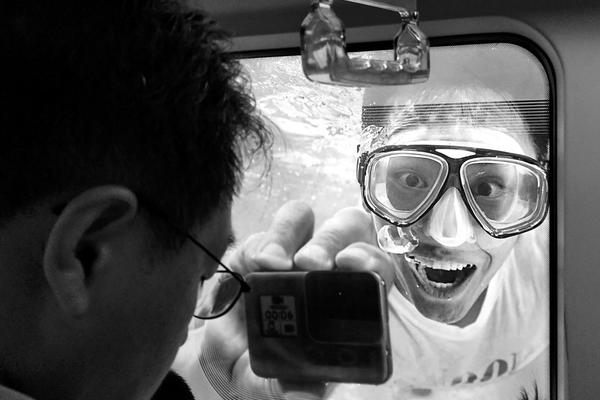A newly-tested artificial womb could cancer woman deep eroticismchange the way doctors care for babies born prematurely, according to new research.
The new study, published Tuesday in the journal Nature Communications,details the testing of a "womb-like device" on fetal lambs, which develop lungs in utero much the same way humans do.
SEE ALSO: Giant icebergs are a big tourist draw in Newfoundland, and a warning signThe lambs involved in the study lived inside the device -- which uses a container filled with liquid -- for about four weeks, breathing amniotic fluid inside of a temperature-controlled environment.
While video footage of the lamb within the artificial womb may look startling at first, the device could one day be a "bridge between the mother's womb and the outside world," said Dr. Alan Flake, co-author of the study, n a statement.
 Original image has been replaced. Credit: Mashable
Original image has been replaced. Credit: Mashable "If we can develop an extra-uterine system to support growth and organ maturation for only a few weeks, we can dramatically improve outcomes for extremely premature babies," Flake, a doctor at the Children’s Hospital of Philadelphia, added.
This study wasn't designed to replace a mother's natural womb, but the invention could one day help keep premature infants off ventilators and out of incubators when they are born.
But that day isn't here yet.
Assuming the team's animal results can be translated into human healthcare settings, Flake estimates that clinics could be using this type of system sometime in the next 10 years.
(Editor: {typename type="name"/})
 Brett Kavanaugh's law school roommate says he used to eat pasta with ketchup
Brett Kavanaugh's law school roommate says he used to eat pasta with ketchup
 We need to talk about the Keebler cookie Twitter account
We need to talk about the Keebler cookie Twitter account
 Prince George and Princess Charlotte look seriously adorable in new royal christening photos
Prince George and Princess Charlotte look seriously adorable in new royal christening photos
 Amazon Big Spring Sale 2025: Best Apple deals on iPads, MacBooks, and more still live
Amazon Big Spring Sale 2025: Best Apple deals on iPads, MacBooks, and more still live
This fat bear's before and after photos are stunning
 Welcome to Fat Bear Week 2021!Katmai National Park and Preserve’s brown bears spent the summer
...[Details]
Welcome to Fat Bear Week 2021!Katmai National Park and Preserve’s brown bears spent the summer
...[Details]
Donald Trump Dalek is proof that Londoners sure know how to protest
 We Brits might be rubbish at a lot of things, but protesting is one thing we've got down to a fine a
...[Details]
We Brits might be rubbish at a lot of things, but protesting is one thing we've got down to a fine a
...[Details]
All the money Kylian Mbappé made from the World Cup is headed to charity
 Kylian Mbappé, one of the (very young) soccer players on team France who took home the 2018 W
...[Details]
Kylian Mbappé, one of the (very young) soccer players on team France who took home the 2018 W
...[Details]
 Tech companies are continuingto take action as Russia's war in Ukraine rages on. Search engine DuckD
...[Details]
Tech companies are continuingto take action as Russia's war in Ukraine rages on. Search engine DuckD
...[Details]
TikTok ban looms in U.S. Here's the latest.
 The Trump administration extended the deadline for the owners of TikTok to sell their asset until Ju
...[Details]
The Trump administration extended the deadline for the owners of TikTok to sell their asset until Ju
...[Details]
Is TikTok down today? Yes, with a major outage
 TikTok is down, and we don't mean just in Russia. According to numerous user reports on Twitter, Tik
...[Details]
TikTok is down, and we don't mean just in Russia. According to numerous user reports on Twitter, Tik
...[Details]
Dog lovers are outraged by an op
 An op-ed published by the San Diego Union-Tribunecalling dogs "parasites" is getting a pretty bad re
...[Details]
An op-ed published by the San Diego Union-Tribunecalling dogs "parasites" is getting a pretty bad re
...[Details]
Compare the new iPhone SE with the 2020 version
 The iPhone's home button lives on. Apple dropped its newest iPhone SE at its "Peek Performance" even
...[Details]
The iPhone's home button lives on. Apple dropped its newest iPhone SE at its "Peek Performance" even
...[Details]
The Biggest Tech Fails of the Last Decade
 Any organization, be it a multi-billion-dollar corporate behemoth or lowly startup, can launch a hyp
...[Details]
Any organization, be it a multi-billion-dollar corporate behemoth or lowly startup, can launch a hyp
...[Details]
Steam Deck tips: Essential shortcuts, including a way to view the whole shortcut list
 Valve's Steam Deck is an impressive piece of gaming tech, but there's definitely a learning curve.Ev
...[Details]
Valve's Steam Deck is an impressive piece of gaming tech, but there's definitely a learning curve.Ev
...[Details]
Trump's science adviser pick is actually a good scientist

Scientists have developed the world's first full

接受PR>=1、BR>=1,流量相当,内容相关类链接。